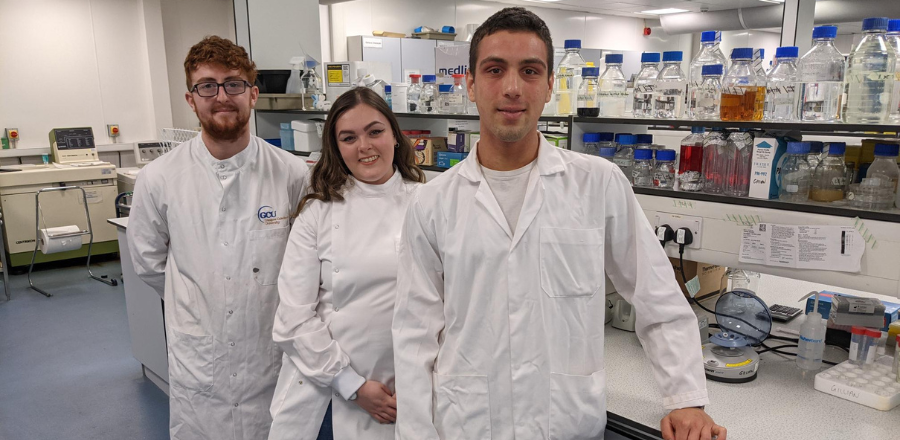Climate change top priority for students this summer

Three enthusiastic students are giving up their summer to help make GCU’s Biomedical Science laboratories more sustainable.
Amy Campbell (Microbiology), Connor Cusack (Microbiology) and Stefan Corradini (Cell and Molecular Biology) have teamed up with Dr Gillian Hunter, Dr Yvonne Dempsie and GCU Sustainability Officer Paulo Cruz, as part of the eight-week LEAF Internship (Laboratory Efficiency Assessment Framework), which supports GCU’s Strategy 2030.
Developed by University College London (UCL), LEAF are working with 71 institutions across Europe to help tackle the climate crisis by supporting lab users cut back on plastic, water, energy and other resources.
With the internship running over the course of July and August, we caught up with Amy, Connor and Stefan at the halfway point to hear how things are progressing.
Give us a bit of background, how did this all come about?
Amy: “The whole thing started when the department got funding from the university as part of GCU’s Strategy 2030.
“Sustainability has never really been a focus because labs in general are so resource intensive. Even if you’re applying for a research grant, there’s no criteria you need to hit for sustainability. So basically if you’re applying for money, the environmental impact isn’t going to be at the front of your mind. Now though, there’s more investment across the UK in research and development and I think there’s been a realisation, especially with COP26, that we need to help play our part to help tackle climate change."
Stefan: “What we’re basically trying to show is that if the university applies certain measures then they can save on cost. That money can then be put back into the labs so that more research can be done.”
Why did you all want to get involved?
Connor: “When you’re going into fourth year, you start to think more about your career prospects. I was looking at different avenues I could try out and I was going through Blackboard online – that’s when I saw the post about this opportunity.
"We mentioned COP26 earlier and it’s all coming to the forefront now; climate change is an area that could have lots of job opportunities in future.
"It’s actually helping me learn more about the actual labs, in terms of equipment and the work that’s being done - that’s something I’ve not had much experience of before.”
Amy: “I’ve always been interested in sustainability; I was a bit of a swot in school and got people in to do talks about it! When I saw the job advert, I knew it would be really interesting.
"Like Connor, I didn’t know too much about the labs because covid and the fact I was second-year entry.”
Stefan: “I’m going to be working at these labs during my PHD and I want to have a lower impact on the environment. Working specifically on this internship will also allow me to continue pushing this project throughout the next three years and make my research more specific.
"I also believe that you need to be efficient with the resources you get from grants – most of the research here at GCU is charity and government funded. If we can look at how we can use that money more efficiently then we can increase the output of the university’s work and the impact it has on society.”
What’s your actual role in all of this?
Amy: “We need to tackle 'calculators', which are things like waste and fume cupboards. There are also really simple things: we’re linking up with IT to look at putting signs in place for students to reduce the brightness on the computers.”
Stefan: “We’re also going to try and implement a pledge for students so that when they’re using the labs they’re aware of the environmental policies we have and then adhere to them.
“Every student has to have a health and safety workshop before they do lab work, so we’re thinking we could introduce something similar in relation to the environment."
Is there potential for this to become a long-term project?
Connor: “The LEAF framework has a gold, silver and bronze accreditation based on how sustainable your practices and procedures are. By the end of the eight weeks, we’d be aiming to have procedures in place that would help us achieve bronze accreditation. After that, we’d be looking at setting up a volunteer team within the university to help us get to silver and gold.
“At this point, we’re also trying to speak to as many people as possible within the department to raise awareness – after that we’ll be looking to increase it in scale.”
Amy: “Even though we’re in the Biomedical Science Department, our work is applicable to any lab. We’re hoping we’ll be able to pass on our findings to the Chemistry department within GCU and that they would do something similar.”
Are there any challenges in helping you get bronze, silver and gold accreditation?
Stefan: “It’s definitely achievable but one of the potential issues is cost. There are two key questions that need to be addressed: how much will our measures save in cost? And, how much will our measures add to the costs of the university? We need to find a balance.
“For example, we could use more recyclable products in the labs, but they come at an increased cost. We just need to try and find affordable solutions.”
Amy: “We’ll be presenting to the university at the end of this programme. The good thing about focusing on the ‘calculators’ is that it generates a baseline for the financial cost. We’re hoping to have this in place over the next week and then closer to the end of the project, we’ll look at the calculators again and see if we’ve saved the university money.”
Find out more about sustainability at GCU.
By Ross Clark
Got an SHLS or GSBS story? Email me at Ross.Clark@gcu.ac.uk or message me on Twitter
